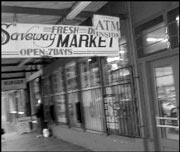NO MORE Mr. Nice Guy. City Hall is sacking its longtime good-neighbor program intended to voluntarily limit the sales of cheap, high-alcohol products to chronic street alcoholics in Pioneer Square.
Instead, city officials for the first time will ask the state to impose compulsory product bans and other forcible restrictions by legally declaring Pioneer Square an official Alcohol Impact Area. Similar mandatory changes may also be imposed on the International District, Capitol Hill, and other city neighborhoods where voluntary programs have produced only limited success.
“In a nutshell, our report’s going to say we failed—the voluntary system just didn’t work—and we’re going to ask [the Seattle City Council to] direct us to go to the State Liquor Control Board and ask that restrictions be made mandatory in Pioneer Square,” says Gary Johnson of the Department of Neighborhoods.
The council should take action next month. That’s the next step in a formal alcohol-impact process that began in August last year when the city’s voluntary, good-neighbor areas were drawn up under a new state law (earlier good-neighbor plans dating to the mid-1990s also failed but didn’t have the new legal component of eventual mandatory restrictions).
Liquor board spokesperson Bob Riler says that besides forcibly banning to-go sales of specific types and brands of alcohol, formation of a mandatory Alcohol Impact Area under the two-year-old law would allow the city more time to review and comment on liquor applications and limit hours of liquor sales.
Some officials think Seattle could end up with a citywide sales ban on bargain-priced fortified wine and malt liquor that are favored by street drinkers. The voluntary program showed sales restrictions to be unworkable if they’re imposed in one area but not in another nearby; that merely moved the problem around.
Most importantly, the city found that one reluctant retailer can single-handedly sink the plan if it’s voluntary. In Pioneer Square, officials say, that retailer was the little Saveway Market on Occidental Avenue South, where the biggest sign in its front windows is a beer logo.
“Saveway was the only holdout,” says Nancy Woodford, a Pioneer Square community advocate who met with retailers and landlords. “They continue to advertise the sale of prohibited products.” That “hurts the good-neighbor stores who are in full compliance,” she says.
(One other store had been holding out. But that outlet, the historic Campbell & Fuller deli on Yesler Way, quietly went out of business a few months back.)
A Saveway spokesperson, who wouldn’t give her name, says the store owners felt the restrictions were unfairly applied. Though several other Pioneer Square outlets restricted sales, Saveway balked after watching potential customers stroll or ride a free bus a few blocks to the Chinatown/ International District and buy 40-ounce beers, $2 wine, and other items on the city’s 24-page list of restricted products.
“It’s not like we were the bad people,” the Saveway spokesperson says. “We didn’t have a problem signing the agreement—if everyone else signed it.”
Liquor board records list Saveway’s owner/licensee as Jay Y. Hur, who has filed to transfer the license to a family member, Patty Ann Hur.
The store is a half block from Occidental Park, a chronic drinkers’ hangout. City records show Saveway was at one time selling 800 gallons of 40-ounce beer per month.
Patrick Vanzo, a supervisor in the King County Department of Community and Human Services, says “It’s very easy to walk that neighborhood and see stores that previously sold [cheap booze] and they don’t have people coming in and out of them inebriated. Then stand in front of this store [Saveway] and watch the sales, the overservice and the people coming out, and the drinking behavior that begins in that area.”
That could change if mandatory controls are imposed, possibly by early next year, officials say. City Council member Margaret Pageler thinks the threat of extending mandatory restrictions and the license hassles that goes with them could cause retailers in other areas to opt for strict voluntary compliance.
“If we enact this ordinance for Pioneer Square,” she says, “the merchants in Capitol Hill [for example] will understand that if they continue to contribute to the death of chronic inebriates by feeding their habits, we’ll extend the ordinance to Capitol Hill, and it’s in their own survival interest as businesses to be good neighbors.”
Though treating alcoholism is vastly more complicated than just limiting sales, council member Richard Conlin says restrictions have proved to be a creditable contribution to the effort (each chronic street drunk can cost taxpayers an estimated $100,000 a year in medical and public-safety expenditures). Once reluctant to back the ban, “Right now,” Conlin says, “I’m at the stage where I’m saying: How fast can we move?”








